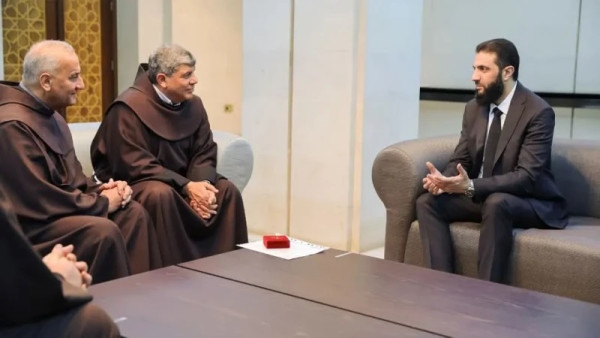
Father Ibrahim Faltas, vice custodian of the Holy Land, meets with Ahmed Al-Sharaa, the head of Syria’s new administration, in Damascus. / Credit: CTS
Ishtartv.com - catholicworldreport.com
By Souheil Lawand, January 13, 2025
More than a month after Syria’s
political shift, Christians there are vocalizing a sense of relief as initial
assurances for their safety and security by the de facto government have
reportedly been provided. Christians continue to seek more concrete guarantees,
although opinions differ on what form these guarantees should take.
For some Christians, the Church
remains their primary safeguard, as it has been since Ottoman rule. In this
view, clergy are in charge of representing their communities in political and
legal arenas.
The Greek Orthodox Patriarch, John
X (Yazigi), is the most visible Christian leader in Syria, alongside the Latin
apostolic vicar, Bishop Hanna Jallouf. The latter enjoys a longstanding and
strong relationship with the new authorities. He recently visited his hometown
and parish (Al-Qaniya, Idlib countryside) for the first time since his
episcopal appointment, where he was warmly received.
Despite an important meeting
between church leaders and representatives with Ahmed Al-Sharaa, the head of
Syria’s new administration, three patriarchs based in Damascus were notably
absent. The absence was reportedly due to the customary visit of Patriarch
Yazigi to congratulate the new leader — a visit that traditionally precedes any
other meetings with clergy.
Laity and the Syrian brothership
Another group of Christians
believes that clergy should not be the sole guarantors of their rights, but
laity also plays a crucial role.
This stance has been echoed by
prominent figures such as the apostolic nuncio to Syria, Cardinal Mario Zenari,
and the Syriac Catholic archbishop of Damascus, John Jihad Battah.
Aligning with this vision, many
Christians expressed reservations regarding a recent statement by French
Foreign Minister Jean-Noël Barrot, who expressed France’s support for “civil
society and Christian representatives in Syria.” Jesuit Father Murad Abu Seif addressed
Barrot directly, stating: “We don’t want to be mere coexisting groups; we
aspire to be brothers living with and for one another. Today, Christians seek
to defend all Syrians so we can all live in freedom and dignity.”
Al-Sharaa’s remarks on Pope
Francis
Father Ibrahim Faltas, vice
custodian of the Holy Land, who visited Damascus near the end of the year,
highlighted in an article for the Vatican’s L’Osservatore Romano that Al-Sharaa
expressed admiration for Pope Francis, calling him a man of peace and
commending his advocacy and actions for the people.
Meanwhile, the Christian community
recently witnessed sharp criticism of the patriarch for the absence of Syria’s
new flag in the patriarchal salon. The backlash, driven by a group calling
themselves the “Antiochian Movement for Change,” escalated to accusations that
he was a remnant of the previous regime, with demands for his resignation. This
attack was widely condemned by both the Church and the public, who viewed it as
politically motivated.
Daily life for Christians
Over the past month, Christians
have largely been spared from targeted incidents, with a few isolated
exceptions. For example, in Aleppo’s predominantly Christian Sulaymaniyah
neighborhood, a man used loudspeakers to urge women to wear hijabs and avoid mingling
with men. Authorities have generally handled these incidents with wisdom.
All Syrians, including Christians,
are experiencing some relief, particularly with the Syrian pound stabilizing
against the U.S. dollar and prices dropping by up to 40%. Bread, gas, and
diesel — scarce for years — have become more accessible. Additionally, the
director general of Electricity Transmission and Distribution announced that
two ships arrived from Turkey and Qatar to aid in power generation.
|